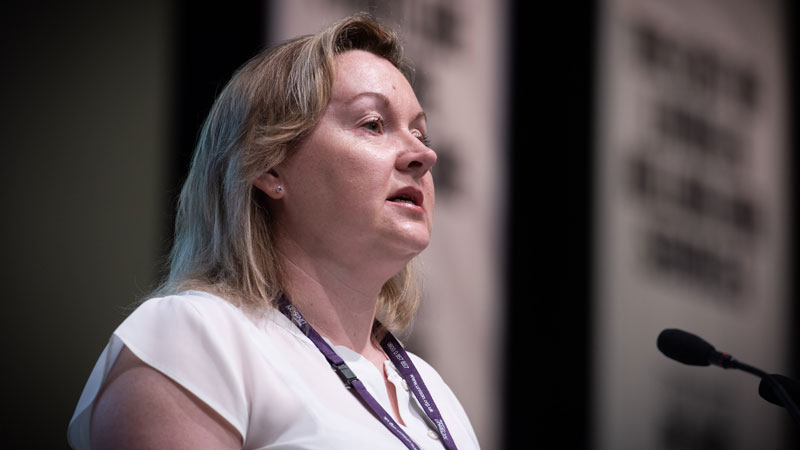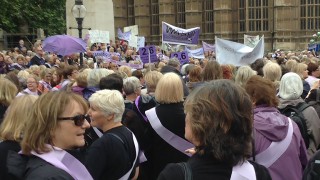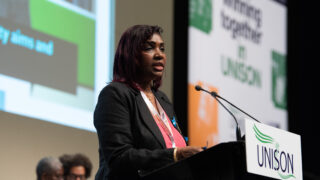On the final day of their national conference, UNISON delegates passed motions on a number of major issues affecting women’s rights, in and out of the workplace.
In the first, the union is now seeking the implementation of CEDAW (the United Nations convention on the elimination of all forms of discrimination against women) into domestic legislation.
The convention is exclusively devoted to gender equality. One of the core human rights treaties of the UN, it requires any country that ratifies it to undertake legal obligations to respect, protect and fulfil women’s human rights.
Proposing the motion, Sharon Foster of the NEC (pictured above) told delegates that CEDAW “is a tool that is helping millions of women around the world… in their everyday lives.”
However, while the Thatcher government ratified CEDAW in 1986, the UN concluded in its last review, in 2019, that the UK was still not compliant.
“This is virtuous signalling on a grand scale,” Ms Foster said, adding that the government’s claims that women’s rights are taken care of in the Equality Act 2010 and Human Rights Act, are “blatantly not true.”
And as Westminster ignores CEDAW, work is currently underway to draft the CEDAW convention into both Scottish and Welsh law.
Ms Foster said that, “Implementing fully would make a huge difference”, not least in the fight against rising domestic violence in the UK, combatting the loss of protections as a result of leaving the EU, and in ending gender-based stereotypes.
Jackie Lewis, for the national lesbian, gay, bisexual and transgender plus committee, noted the decision by the UN committee in March this year that the criminalisation of consensual, same-sex intimacy between women is a violation of the convention.
The decision sets a legal precedent that could affect millions of lesbians and bisexuals in most of the 40-plus countries where they are still criminalised.
Elizabeth Cameron of the national Black members’ committee, added: “In so many countries in the world, to be a lesbian, to be bisexual is still a crime. Thousands of people can be hounded in their countries and at worst can be killed.” She said that implementing CEDAW “is crucial, not just for their lives – but to stay alive.”

Lianne Dallimore of Cymru/Wales (pictured above) told delegates: “Poverty has a woman’s face.”
Three million women in the UK are low paid, compared to 1.9m men, she said. These are, “women working in education, the NHS, care, retail – services this society can’t do without.”
Underlining the need for urgency on the issue, Ms Dallimore added: “We can’t perpetuate this narrative where a women’s bill of rights is too hard to implement.”
And on a different aspect covered by the convention, Stephanie Grimshaw of the Welsh Government branch said: “It’s so hard to be a woman in public space… No woman in this country can say they feel 100% safe all of the time.”
Last year alone, 1.6m women and girls experienced domestic violence, she said.
In passing the motion, delegates called on the NEC to develop a campaign for the implementation of CEDAW into domestic legislation, working with other organisations as appropriate. And with Labour Link it must seek to develop a campaign for the Labour Party to support CEDAW and pressure the government to act.
In other motions:
Challenging sexism and misogyny
Delegates voted for the NEC to:
- Work with each service group executive to develop clear action plans for UNISON to “do everything in its powers” to eliminate sexism and misogyny in members’ workplaces;
- Make a public statement that it is opposed to sexual harassment, discrimination and misogyny and make it clear that action will be taken against any member who is found to perpetuate such behaviour;
- Provide guidance to all members of the NEC, service group executives and regional convenor teams on how to act as champions of anti-discriminatory practice.
Bringing men on board
The union also voted to support the White Ribbon UK charity, which engages with men and boys to make a stand to end gender-based violence.
White Ribbon accreditation is awarded to organisations of any size who demonstrate their commitment to changing the culture. Individuals can sign up to be White Ribbon ambassadors (men) or champions (women).
Although some UNISON branches have achieved accreditation, UNISON as a national body has not. Conference has instructed the NEC to begin the process of applying for White Ribbon accreditation, with the aim of achieving this by next year’s national delegate conference.
The NEC is also to write to all branches encouraging them to become accredited, or support their members to become ambassadors and champions.
As one delegate told conference: “Men can be allies in ending violence and harassment.”
Supporting low-paid women to be active in the union
While UNISON’s structures try to ensure that low-paid women are represented at all levels of the union, delegates acknowledged the challenges of organising in the sectors that are predominantly low paid and female – and that more work is needed.
They charged the NEC to work with the national women’s committee, the regions, the private contractors forum, service groups and other self-organised groups to:
- Conduct a review of low-paid women’s involvement in the union;
- Convene a seminar for all low-paid women elected to the NEC and service group executives that will consider proposals for improving involvement of low-paid women and review current bargaining priorities to ensure they are appropriate to this group of members;
- Develop a programme that will support and mentor women activists into leadership roles in branches and regions;
- Recognise the different experiences of women in all four countries of the UK;
- Develop a strategy for increased recruitment, organising and campaigning around issues relevant to low-paid women;
- Consider setting up a commission to look at the barriers to low-paid women’s involvement with the union and find ways to address these.
Improving the safety of sex workers
After an impassioned debate, delegates voted to follow this year’s women’s conference in ending support for the ‘Nordic Model’ related to sex work, which decriminalises the selling of sexual services while criminalising those who buy sex.
Support of the model has been the union’s policy since 2010. But since then, many organisations, including Amnesty International, have found that criminalisation of any kind, including for buyers, causes serious harm to sex workers – by putting their livelihoods at risk and increasing police harassment, client violence and stigma.
Conference recognised that decriminalisation “is not about encouraging sex work – it’s about the safety of people who sell sex.”
Delegates resolved that UNISON would no longer call for a sex buyer law, while the NEC, national LGBT+ committee and others would review and advance the union’s policy in this area.
Read more reports from 2022 national delegate conference




